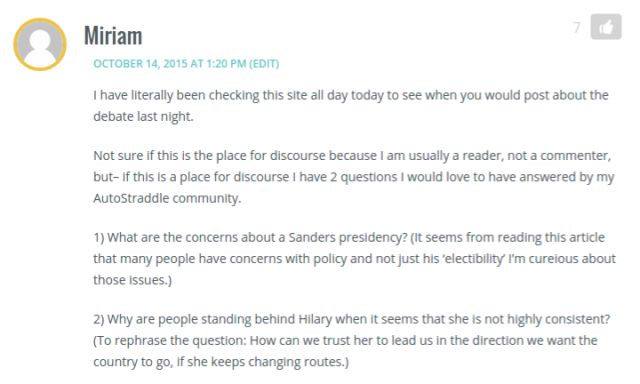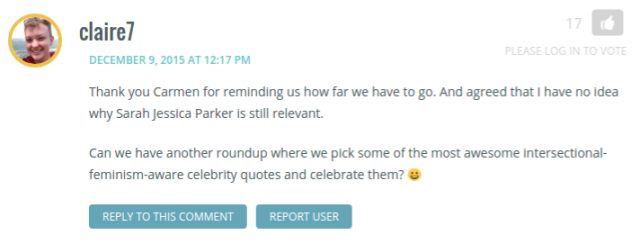
What if “don’t read the comments” wasn’t a rule of thumb for those of us who populate this weird, wonderful world of the web?
The short answer is that everything would change.
The entire Internet stands to benefit from a better comment culture, and yet many websites are giving up on the idea of building one at all. (Riese has written about this previously.) Websites are cutting their comment sections, or hiding them, or suffering from trying to maintain them. We’ve arrived at a point when we often no longer have to labor through the troll-filled comment sections on some of our favorite sites — a point at which we lose the chance to be engaged in a community when we’re visiting them.
And this point — this exact moment for all of us digital denizens in this big, bright, world — this is the point at which Civil has come to change things up.
https://vimeo.com/131170273
Civil is a new software that seeks to create stronger, better, civil-er discourse online. Their method is simple: commenters are asked to evaluate and report the civility of comments on the websites they visit, including their own. Then, a machine eats all that data and devises a filtering system cutting the least civil comments from the conversation. It’s a software that makes comment moderation less of a burden, gives the folks who work at websites more time to focus on community-building instead of community monitoring, and demands that all of us participate in building a more civil Internet.
“Our ultimate goal is that five years from now, people will look back on this time and think, Wow, remember when Internet comments were terrible? I can’t believe they used to be that way! We want online culture to more closely reflect real-world social structures,” Christa Morgan, Civil’s Co-Founder, told me. “What we’re building is, hopefully, a good first step in that direction.
The basis of Civil is undeniable: That comments are fundamentally broken, and when they’re not broken anymore the Internet will flourish like never before. That’s true, and I know so because I work here. I know that an awesome community of commenters makes for an awesome website, and it’s because for a hella long time I’ve had the absolute privilege of talking to awesome commenters on this awesome website.
When comment culture actually works — which is to say, when the chance to comment is actually a chance to engage in conversations, socialize, and learn (and not to bully or be bullied) — the Internet’s real benefits shine through. Suddenly, the world wide web transforms from a place where people are mean to each other to a place where people are opening up to one another. Instead of worrying about the consequences of sharing our feelings, we can revel in the inevitable truth that we’re not alone in having them. Even better? We can learn, debate, grow, and challenge each other without fear of retaliation or brutality.
“What we’ve already seen happen — and it’s incredible — is that people really focus on each other’s ideas, instead of lobbing personal attacks at one another,” Morgan said. “Conversations can actually progress to a logical conclusion — even if that conclusion is let’s agree to disagree —because they’re not caught in a cycle of name-calling and retaliation.”
Civil asks us to think twice about the way we’re talking to each other online. Or, rather, it asks us to think about it more than a few times. And by doing so, it demands that we be the comments we want to see on the Internet. A commendable cause, indeed!
To honor the occasion, I’d like to lay out some strategies for more civil comments that can be used around the Internet. And you know how I know they work? Because I work here, and you comment here, and all of these hypothetical comments are things people like you — yes, you, in the cute shirt right there — have said to us.
Seven Kinds of Civil Comments You Could Leave Today
1. Hello, It’s Me, I’d Like to Politely Inquire As to Other Opinions On This Topic

The Format: Hey! I feel X about Y, but I know a lot of folks have different opinions on Y and I am not a know-it-all because nobody really knows it all, y’know. So! Does anyone who feels Z about Y feel like talking to me a bit about A, B, or C? I’m really interested in a different perspective.
When to Post It: When you’re genuinely interested in hearing from people who maybe disagree with you, or at least hold different opinions or perspectives on a specific topic than you do. The catch is that you cannot do so with the intention of then beginning an argument with them, because that’s uncool.
As Seen on Autostraddle: I think one of the most groundbreaking things that ever happened on the Internet was when Rachel wrote about the second Democratic debate and someone asked a question that most people answered really sincerely and without any incivility at all. The question? At its heart, it was: hey, can people who maybe aren’t hardcore supporting Bernie Sanders come on down and talk to me about it? What ensued included a gentle back-and-forth conversations about a tense primary that even included the words “thank you!”
2. Adding to a Post Without Detracting From It
The Format: Hey, [Author Name]. Thank you so much for covering this topic. You made some really great observations here! I just wanted to add my own two cents, because I spent 5.98 on a burrito and I hate pennies: [Insert previously undiscussed perspective, information, or point of difference.] It was a bean and cheese burrito just in case you were wondering.
When to Post It: When you’ve just finished reading something that was awesome sauce but didn’t mention an article on the topic you loved, integrate a perspective you hold, or differed from your own opinion. Also, if you’re gonna blow everyone’s mind and connect the dots between two issues or two pieces on one issue, that’s fun! The point is that you don’t come in swinging and trying to trash someone’s work — instead, you come to the comment section with the intention to broaden or expand upon the angle of their piece. Intention is everything, and so is not being a jerk.
As Seen on Autostraddle: A strong example of this comes from my piece on the closing of DC’s lesbian bar and one of the last lesbian bars standing in the US, in which many a fine feathered friend came on down to tell me about the things they felt were cause for not only Phase One’s shuttering, but the legions of shut-down lesbo bars across the country and the world. I loved these people so much that I would like to take them all to Phase One, which has since reopened, when I return to DC.
3. Very Nicely Asking for the Content You Want

The Format: This article on XYZ was great! Any chance y’all could cover ABC, seeing as how it is clearly related to the topic at hand in this piece and also relevant to your audience?
When to Post It: When reading one thing has left you with a burning desire to read another, but the other does not yet exist.
As Seen on Autostraddle: When I wrote about the dumb things famous women had said about feminism in 2015, a lot of y’all were understandably bummed out. I mean, that shit was like, Bummer Central. Which is why it made a super duper amazing load of sense for the one and only Claire to ask me for a happier counterpart piece as the next post in my Rebel Girls series, and her polite wish gave me even more reason to put together a list of awesome women.
4. Calling Out and Coming Back
The Format: I know that you came at this with strong and good intentions, but I wanted to point out to the readers and you, [Author Name], that you’re missing a valuable piece of information! Here it is. (And after, when the piece is corrected, you come back to recognize the effort and thank the author!)
When to Use It: When to call someone out? Well. When someone uses a turn of phrase that reflects a community but isn’t used by that community, when someone’s piece is missing a valuable nugget of actual factual information, when someone expresses an opinion that is problematic, etc. etc. I think what is important here, though, is the expression of good faith. This is a comment for someone who you know is doing their best to serve a reader like you – and thus, the comment isn’t snarky or mean. Just helpful, gentle, and, yes, critical. Because that can happen!
As Seen on Autostraddle: Laura’s piece on Flint got taken up a notch by a commenter, and Laura also heard out that commenter presumably because they were so so cool.
5. The Simple “Thank You!”

The Format: Thank you for this piece! (That’s seriously it.)
When to Use It: When other words fail. When something is so beautiful, or deeply moving, or raw and personal, that to share a personal anecdote or do anything, really, except admire it in the comment section would be meaningless. When something is informative, and well-researched, but maybe doesn’t give you a jumping-off point for a funny one-liner comment or a feelings-filled passage on how it changed your life. When you wanna recognize someone’s work but don’t have anything to add or much to say besides that it was helpful / relatable / informative!
As Seen on Autostraddle: So many times over, y’all. Over and over and over and over. THANK YOU FOR THAT, PS. (I’m talking to you, people who commented on my most recent Rebel Girls.) This comment field is just chock-full of them, though.
6. I’m Working Through Some Feelings and I’m Not Passing Judgement on Anyone Who Has Made a Decision on Similar Ranges of Feelings
The Format: I’m not sure how I feel about the topic at hand, and thus I am about to elaborate on my mixed feelings on said topic. Throughout this elaboration, I will center my own experiences and refuse to judge or mock anyone who is steadfast in their decision to feel one way or the other about this topic.
When to Use It: When the Internet is up in arms about whether something was “good” or “bad” and you’re undecided, or when something major happens in your community and people have decided they are either for it or very much not for it, and you don’t really know because you couldn’t even decide between fish tacos or nachos for lunch and sometimes feeling strongly about a topic is a huge expense of energy. But! You’re interested in sharing your feelings on the topic anyway, perhaps to help yourself sort those feelings out or to get people to weigh in on it and help you shape an opinion. Either way!
As Seen on Autostraddle: When we all opened our hearts to sexy women in STEM, and women in STEM had mixed emotions.
7. My Experience is Different From Yours and It’s Okay

The Format: Thank you for sharing your story, [Author Name]! How brave and really considerate of you, really, to open up and be so willing to tell us the finer details of your life on the Internet! I related to your story, but my experience was a little different. Here’s how…
When to Use It: When the person who wrote an article is not you, or does not come from the same set of experiences, and thus their story differs from yours though what they went through resembles something you went through, too. This is kind of a variation of Civil Comment Type #2: You’re adding to a narrative by talking about your own experience in the comments, and you’re doing so without passing judgement on someone for having an experience unlike yours or failing to tell your exact story.
As Seen on Autostraddle: When I told y’all I was broke and you responded with a resounding “us too!” and shared your own insights and tales of terror in the comments section.
Okay, y’all. Now come on down and show ’em how it’s done: Leave a bunch of civil comments down there!







